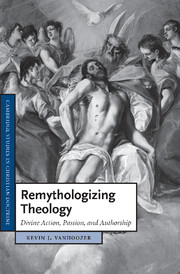Book contents
- Frontmatter
- Contents
- Preface
- Introduction: What is remythologizing?
- Part I “God” in Scripture and theology
- 1 Biblical representation (Vorstellung): divine communicative action and passion
- 2 Theological conceptualization (Begriff): varieties of theism and panentheism
- 3 The new kenotic–perichoretic relational ontotheology: some “classical” concerns
- Part II Communicative theism and the triune God
- Part III God and World: authorial action and interaction
- Conclusion: Always remythologizing? Answering to the Holy Author in our midst
- Select bibliography
- Index of subjects
- Index of scriptural references
2 - Theological conceptualization (Begriff): varieties of theism and panentheism
Published online by Cambridge University Press: 04 May 2010
- Frontmatter
- Contents
- Preface
- Introduction: What is remythologizing?
- Part I “God” in Scripture and theology
- 1 Biblical representation (Vorstellung): divine communicative action and passion
- 2 Theological conceptualization (Begriff): varieties of theism and panentheism
- 3 The new kenotic–perichoretic relational ontotheology: some “classical” concerns
- Part II Communicative theism and the triune God
- Part III God and World: authorial action and interaction
- Conclusion: Always remythologizing? Answering to the Holy Author in our midst
- Select bibliography
- Index of subjects
- Index of scriptural references
Summary
At the heart of Christian theology, as an intellectual activity, there lies the continual interpenetration of dramatic and ontological.
(Donald MacKinnon)The development of doctrine proceeds in fits and starts. One key period, according to Martin Hengel, was the twenty years after the death of Jesus: “More happened (in christology) in this period of less than two decades than in the whole of the next seven centuries.” Others refer to this fecund theological period as the “Big Bang” of Christian origins. If there is a Big Bang in theology proper, however, it may pertain less to the origins of the doctrine than to the bombshell dropped in the early twentieth century by Karl Barth on the playground of the modern theologians. For better or for worse, the shaking of the foundations of classical theism has provoked a massive rethinking and has led many to propose new, revolutionary paradigms for the doctrine of God.
This chapter explores some of the major theological approaches for dealing with the canonical texts and thematic issues examined in the previous chapter. Where the previous chapter focused on biblical representations, the spotlight here is on theological conceptualization. More specifically, the focus is on theological isms: comprehensive systems of ideas – conceptual schemes – that account for the way in which God both relates to and differs from everything else.
- Type
- Chapter
- Information
- Remythologizing TheologyDivine Action, Passion, and Authorship, pp. 81 - 138Publisher: Cambridge University PressPrint publication year: 2010



